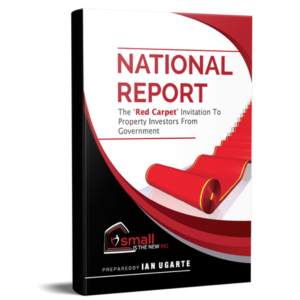What’s a property really worth? And why do valuations vary so wildly between the banks, real estate agents, and what buyers are willing to pay at a given point in time? It can be confusing no matter what side of the purchase negotiation you’re on. In my chat with realestate.com.au, I break down how and why property valuations differ, and which party ultimately rules the market. Check it out below!
Why banks, agents and the market value property differently
By Erin Delahunty. realestate.com.au, June 19, 2020.
To the uninitiated, the way property is “valued” in Australia can be mighty confusing.
Owners contemplating selling can get quite different estimates for what their property is worth – depending on the source. That’s because lenders such as banks, real estate agents looking to secure the listing and then ultimately, “the market” all value property differently.
But why?

Housing expert Ian Ugarte, co-founder Small is the New Big, which focuses on making affordable housing available to Australians on limited incomes, said the different entities value property differently because their positions and perspectives vary.
“Banks value properties conservatively since they need to ensure there’s sufficient buffer in the value of the property to recover the debt should the property owner, the mortgage holder, default,” Mr Ugarte said.
“On the other hand, agents value properties on the higher side, because they want to secure the listing and look favourable in the eyes of the property owner, the vendor. As a result, they will often suggest to the vendor that the property is worth more and then, if necessary, manage the vendor’s expectations once they secure the listing.
“Ultimately though, the market is the true indicator of a property’s worth, since it accurately reflects what a purchaser is prepared to pay for the property, regardless of other valuations put forward by a bank or agent,” Mr Ugarte said.
How a lender decides the value of a property
Mr Ugarte explained that independent valuers, acting on behalf of lenders like banks, assess a property’s value conservatively because they have to take into account the lender’s risk exposure and the vendor’s ability to repay the loan.
To do this, they take into account a number of factors including:
- The property itself including land size, its dimensions, the building’s orientation and zoning restrictions
- The property’s position relative to adjacent properties, schools, public transport and other amenities
- The location, age and condition of the property and recent sale prices of comparable homes in the area
- General market conditions and economic risk factors, including interest rates and any announcements made by the Australian Prudential Regulation Authority, an independent statutory authority that supervises the banking sector
Property valuations can be confusing. Scroll down for my answer to who ultimately decides on a property’s worth.

How an agent decides the value of a property
Agents also base their price appraisals on factors such as land size, zoning restrictions, dimensions and orientation along with the property’s position relative to schools, public transport and other amenities.
However, Mr Ugarte said, agents also factor in a property’s “liveability” or how likely it is to evoke an emotional response in a potential buyer which, if high, is likely to boost the price a vendor can get.
“Likewise, agents take into account the sale prices that fellow agents have achieved for comparable properties in the area and the level of supply of similar properties,” he added.
“If it’s a seller’s market, with a limited supply of comparable properties in the area, this will likely boost an agent’s expectations of the sale price they will be able to get for the vendor. However, if it’s a buyer’s market, with an abundant supply of comparable properties in the area, agents might be more conservative in their pricing expectations.”
An agent might also value a property on the higher side to look good in the eyes of the vendor and then manage those expectations once the listing is locked in.
How potential buyers may value a property
Mr Ugarte said the market ultimately values a property on the level of supply of a particular type of property in the area, versus the level of demand for the property in that area.
“In a buyer’s market, prospective purchasers can set their maximum price and negotiate favourable terms such as extended settlement periods with vendors, since they are in a stronger bargaining position with limited market competition. As such, this is likely to deflate the expected value of a property,” he said.
In a seller’s market, robust market competition means vendors are in the stronger bargaining position, with the “fear of missing out” triggering a less rational prospective purchaser, who is more likely to be motivated to pay more to secure a property. As such, this is likely to inflate the expected value of a property, Mr Ugarte explained.

The market reigns supreme
While lenders, valuers and agents might differ in what they think a property is worth, the market always gets it right.
“The market is the ultimate controller of the price, as it is set at whatever property seekers are willing to pay,” Mr Ugarte said.
Want more market updates and advice? Check out my weekly webinar series Matter Of Fact here, where I keep you in the know and answer your questions.





